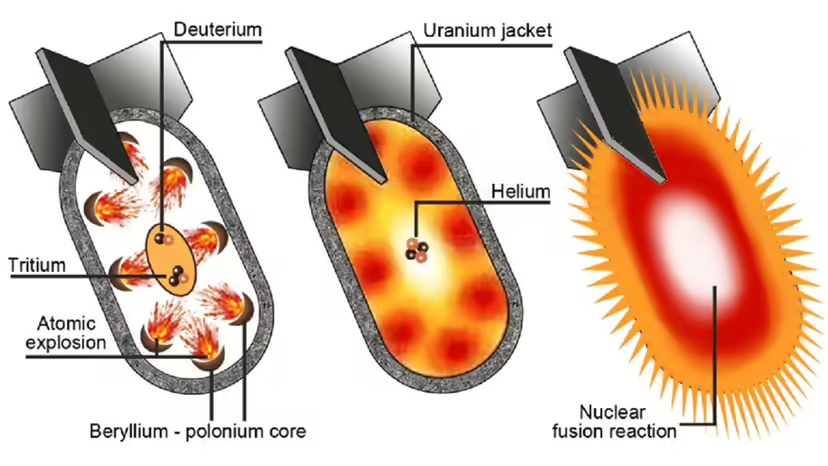
What Happens When a Nuclear Bomb Explodes? Namaste and welcome to TheNewsNamaste, It is frightening to think about a nuclear bomb because they are so strong and do so much harm. Let’s simplify what happens.
It is not like any ordinary bomb. It takes very small pieces of special stuff (like atoms) that break up or combine really quickly.
How Does It Work?
- Getting Started: Inside the bomb, something tiny occurs to get everything started.
- Super Fast Action: This causes the small pieces inside the bomb to shatter or glue together very, very fast.
- Huge Power Burst: This action releases a GIANT release of energy all at once.
- Giant Fireball: This huge energy transforms everything right there into a ball of super-hot fire, hotter than the sun! It grows big very quickly.

What Hurts You Right Away?
Out of that giant fireball, three main bad things radiate:
1. Super Bright Light and Heat: Imagine a second, much larger sun appearing.
- What it does: This blinding flash of light can blind humans for a few seconds, or even forever. The heat is able to make very severe burns on distant skin and ignite fires everywhere.
2. Giant Push of Air (Blast): When the hot ball expands, it pushes air away with incredible strength.
- What it does: This enormous blast of air can topple buildings as if they were made of paper. It produces winds more powerful than any hurricane, which toss around cars and broken objects like toys.
3. Invisible Deadly Rays: At the instant it blows up, it shoots out deadly energy rays you can’t see.
- What it does: They pass through things and into human bodies. Getting struck by large numbers of them makes you horribly ill very rapidly, and you might die in a matter of days or weeks.

What Happens After? (The Leftover Bad Stuff)
The risk isn’t yet over after the initial massive explosion:
1. Radioactive Dust (Fallout): The large mushroom cloud you see following the explosion sucks up dirt, dust, and pieces of the bomb itself. These pieces become radioactive (meaning they emit those harmful rays).
- What it does: The wind blows this radioactive dust way up and way out before it rains back down to the Earth. This dust settles on everything – buildings, ground, water, food. You get sick from radiation by touching or breathing in this dust over time, and it will make you really sick or get cancer later. The worst of this “fallout” can last hours or days, but the area remains hazardous for many years.
2. Zap to Electronics (EMP): If the bomb explodes high in the air, it can emit a strong energy wave that scrambles anything electronic.
- What it does: This zap can shatter cell phones, computers, power lines, and even auto parts, causing them to fail over a massive area.
Nuclear Attack Survival: 10 Easy Tips That Could Save You
How Far Does the Bad Stuff Go?
It’s difficult to know exactly how far the harm goes because it varies a lot with:
- The size of the bomb: The larger the bomb, the greater the harm away from it.
- How high the explosion happens: Exploding airborne is different than exploding on ground or underwater.
- The type of ground and conditions.
But here’s a basic idea of how much the primary hazards can extend for a medium-sized bomb:
- Right at the location: Everything is just GONE. Like it was never there.
- Nearby (possibly up to 1-2 miles or 1-3 km): Buildings get flattened. People receive horrible burns. The invisible rays kill instantly.
- A little further away (perhaps 3-5 miles or 5-8 km): Houses are severely damaged or collapse. Many individuals suffer severe burns. It’s still extremely hazardous from the blast and radioactivity.
- Even more distant (perhaps 5-10 miles or 8-16 km away): Windows shatter at a distance. You could be burned on your skin if you are outside. But the greatest hazard downwind is the radioactive dust (fallout), which will go much, much farther and fall over enormous areas, making them hazardous later.
If It Explodes in Water:
- It creates tremendous waves and splashes radioactive water way up in the air, which rains down as hazardous fallout.
Putting It Simply
An explosion of a nuclear bomb is a horrible phenomenon. It results in intense heat, a giant pressure wave of air, and lethal invisible radiation all simultaneously. Then radioactive dust is dispersed a long distance, rendering places hazardous.


